President Yameen Abdul Gayoom’s assault on democratic norms and principles is continuing unabated. After having declared the state of emergency on 6th February, 2018 for 15 days, he has gone in for a further extension of the emergency provisions for another period of 30 days, i.e. till March 22, 2018. This announcement was made in Male on 20th February, after convening a restricted session of the Majlis (Parliament) without the presence of the opposition members.
Earlier, before proclaiming the first stint of emergency on 6th February, the regime had effectively silenced the Supreme Court by forcibly breaking into the Court premises and arresting two of the five-judges who had pronounced the verdicts on 1st of February, declaring the detention of opposition leaders as legally void and also restoring the status of the disqualified members of Parliament. Chief Justice Abdulla Saeed and another judge Ali Hameed were taken into custody and the rest were warned not to proceed with any possible move to impeach the President. The arrest of the two justices were on the alleged ground of having accepted bribes for their judgement. Former president Maumoon Gayoom was also arrested later for the same reason.
Within a day, the three judges rolled back the earlier court verdict to release political prisoners, one of whom is former president Mohammed Nasheed. The reason given for the reversal of the verdict was that the President had concerns over the release of those prisoners. The point to note is that the second verdict, reinstating the 12 MPs disqualified by the present regime earlier that would have resulted in President losing majority in the Parliament, was not reversed. Abdul Raheem Abdulla, Deputy Leader of Progressive Party of Maldives (PPM), had stated that the Parliament had revoked the disqualifications of the MPs and therefore, the verdict of the court has been implemented. Only later the Supreme Court stayed the implementation of that part of its order and therefore these MPs could not join the key parliamentary vote conducted on 19th February, 2018. The court also rejected a petition challenging the validity of the presidential decree of emergency.
The President requested the Parliament for extension of the state of emergency as he believed that the situation is not back to normal and further investigations were underway. The President’s party holds a contrived majority since the 12 MPs were not allowed to return to the house. Many members of opposition have boycotted the special sitting.
Internal Situation
The ground situation in the country is completely under the military control as the emergency provisions are in force. Government has claimed that that the businesses are functioning normally so as to not affect the economy. The President has reiterated that the country is safe for travel as many countries have issued advisory to its citizens against traveling to the island nation which is a high-end tourist destination. Tourism revenue is a big part of Maldivian economy and is being badly hit by the emergency. The cancellations are on a high and hotel prices have sharply dropped. Chinese tourists form a big chunk of the tourism income (22 percent of tourists in 2017 were Chinese) and their government has issued explicit advisory against travelling to Maldives including bill boards at the airport. The number of tourists have naturally gone down. The US has also issued level-2 advisory, where the tourists should exercise caution owing to risks of terrorism.
Despite governments’ claims, on the contrary, situation continues to be tense. The newly appointed interim police chief Abdulla Nawaz in a tweet mentioned that he was fired due to his resolve of abiding by the court’s decision. Several journalists, NGOs, opposition MPs and citizens of Maldives have expressed anger over the emergency on social media. Many have reacted harshly against the authoritarian rule of the present government. There was also an outrage against the President when the video of Maumoon Gayoom being arrested was posted online. Several people have been arrested since the imposition of emergency, but details are not being shared with the opposition or the public. Ahmed Mahloof, from the opposition Maldivian Democratic Party (MDP) believes that 25 persons have been taken into custody including two journalists for the protests staged before the special sitting of the house.
International Reactions
With a view to garner diplomatic support of ‘friendly countries’, Presidential envoys were dispatched to Saudi Arabia, Pakistan and China. On being asked why India was not one of them, officials in the Yameen government stated that an envoy was proposed to stop at India but due to non-availability of the leadership, he could not visit New Delhi.
Maldivian foreign minister reached Pakistan on 8th of February. Pak PM Shahid Abbasi reportedly conveyed that Pakistan would not support the controversial declaration of emergency. He recalled the time when emergency was imposed on Pakistan in 2007 and maintained that rule of law needs to be given priority in Maldives. The PM also mentioned that Pakistan believes in non-interference in affairs of other countries and adheres to the principles of UN Charter.
Mohamed Saeed, minister in the Yameen government was sent as an envoy to China. He held talks with Chinese foreign minister Wang Yi who reportedly said that China believes that Maldives has the ‘wisdom and capability’ to resolve its internal issues.
Another minister Mohamed Shainee visited Saudi Arabia to discuss the ongoing crisis. He tweeted that his meeting was very successful. Saudi Arabia issued advisory to its citizens travelling to Maldives post the minister’s visit. UAE and Saudi Arabia pledged $160 million in assistance to Maldives amidst the ongoing crisis. Reportedly, the Saudi leadership expressed the view that Maldives will be able to resolve the problems within the framework of its sovereignty without need of external interference.
Reactions of the international community has been uniformly critical. The institutions and governments like the UN Human Rights Council, EU, UK, US and more have expressed grave concerns over the drastic developments in the island nation which have resulted in the constitutional rights of the people being suspended. They urged the President to abide by the court’s decision but his government has taken no such action. The UN High Commissioner for Human Rights Zeid Ra’ad Al Hussein has called it ‘an all-out assault on democracy’.
Sri Lanka, the other close neighbor of Maldives, in a statement issued before the imposition of emergency urged all parties to uphold the rule of law.
Following the growing crisis in the country, envoys from EU, UK and Germany were in Maldives to discuss the evolving situation with the President. The President, however, refused to meet them. The diplomatic community from these nations expressed disappointment over such disregard shown by the President in matters of such urgency. They mentioned it’s ‘not the way forward’.
China Speaks on the Crisis
Since India is being looked up to by the opposition in Maldives as well as former president Nasheed, and in view of its growing economic and strategic interests in the island nation, China has been uncharacteristically strident in its actions and reactions. While maintaining a diplomatically neutral position in its public statements that “it was an internal situation of the country and no outside power should intervene in the crisis as it would intensify the conflict”, the press in China has increasingly painted India as an aggressor in South Asia. A report in China’s Global Times stated that, “New Delhi takes it for granted that it can openly intervene in their domestic affairs (of its South Asian neighbours).” China also rejected UN mediation in the crisis. Chinese foreign ministry spokesperson Geng Shuang has said, “The international community should respect the sovereignty and territorial integrity of Maldives.”
While India has made no such statement or initiated any action that could be construed as an intent to militarily intervene in the conflict, in an apparent response to China’s statements, former president Nasheed reminded the international community that India has always helped Maldives in its hours of crisis. The Indian forces, back in 1988, prevented a military coup against the regime and went back as soon as the situation was resolved.
The point to note is that Nasheed had called China’s growing interest in Maldives as ‘land grab’ and an effort to secure bases in the country. Chinese spokesperson Geng, in regard to that, said that such accusations are baseless and that China has no political strings attached in its business with Maldives. In an unusual move, the Chinese embassy in New Delhi issued a press release on 12th February dismissing Nasheed’s ‘land grab’ accusation as false and ‘groundless with no regard to facts’. China has suggested talks between the relevant parties.
The same day (Feb 12) in a strongly worded article in the Global Times, it was stated that China will take measures if India decided to intervene militarily in Maldives. Accusing India of having become ‘arrogant’ and disrespectful to its neighbour’s sovereignty, the article further stated, ‘India should not underestimate China's opposition to unilateral military intervention.’ It is apparent that China is taking a hard stance on the matter and the crisis is turning more into a face-off between the two large Asian countries.
India’s Position
The situation has become politically explosive and is of serious concern to India. While in its first reaction, India expressed concern at developments, urging to uphold the rule of law, in the second statement on the deteriorating situation in the country, India’s Ministry of External Affairs was more forthright stating, “We are disturbed by the declaration of a State of Emergency in the Maldives”, adding that the Indian Government was carefully monitoring the situation.
In addition to the open request from former president Nasheed calling upon India to send an envoy backed my military to Maldives, and indicating that such intervention was necessary to restore the rule of law in the country, there is also a growing expectation of the regional players and world powers that India must play a lead role in resolution of the situation in the Maldives. It is argued with some justification that any hesitation at this point of time will result in India losing strategic space to China permanently. Some journalists have stressed that ‘doing nothing’ is surely not an option for India. The majority view of strategic experts and the media is that President Yameen has totally undermined democracy and has taken to authoritarian rule, in total disregard to world opinion and persuasion, mostly due to the benign and not so benign encouragement from China. The fear of loss or compromise of Maldivian sovereignty in the hands of China has also been covered by various analysts. In an apparent response to these arguments, Maldives’ High Commissioner in New Delhi, Ahmed Mohammed, speaking to a leading TV channel (NDTV), said that India should engage more with Maldives if there was a concern that China was taking a lead.
The Options
It is widely argued by strategic analysts that India has the broadest spectrum of options ranging from persuasive to coercive diplomacy; from economic blockades to military interventions, resorting to envoy diplomacy to broker peace between the contending political parties, to lending direct support to the democratic forces, mobilizing coordinated international support with likeminded countries to proposing UN backed approach etc. On a graded scale, the option of military intervention could be ruled out at least for the present, till the developments reach a dangerous level posing direct security threat to India’s core interests. Similarly, not initiating any moves for de-escalating and eventually resolving the crisis too is not an option for India, either in its own interest or even in the long term interests of Maldives and the region.
Therefore, as a responsible power, it would be desirable for India to forthwith appoint a senior Special Envoy to engage with all the stakeholders in the country, expanding the arch to the regional friends and progressively to include US, EU, the Commonwealth (although for the present, Maldives stands suspended from its membership) and the UN. Some of the major donor countries including its friends in the Gulf/Middle East should all be approached to facilitate early peaceful resolution of the crisis, aiming at restoration of democracy and re-establishment of the rule of law.
It is earnestly hoped that these efforts would obviate the need for taking recourse to harsher measures such as imposing economic sanctions that would hurt the common citizen. Taking Yameen and the opposition leaders into confidence should be New Delhi’s first priority. As soon as the Yameen government is involved in a dialogue, New Delhi must persuade the regime to enable the democratic processes to start. Lifting the state of emergency could be a good starting point for confidence building.
Sources:
- http://www.un.org/apps/news/story.asp?NewsID=58550#.Wn0vWSVubIV.
- http://www.fmprc.gov.cn/mfa_eng/xwfw_665399/s2510_665401/t1533682.shtml.
- Ministry of External Affairs, India; Press Releases.
- The Hindu, China rejects UN role, offers mediation in Maldives, Atul Aneja; 8th Feb, 2018.
- Times of India, China changes tack on Maldives, wants facilitation of talks, PTI, 8th Feb, 2018.
- Maldives Independent, European envoys ‘disappointed’ by Maldives presidential snub, 8th Feb, 2018.
- AFP, Maldives president shuns European diplomats, 8th Feb, 2018.
- Asahi Shimbun, Associated Press, China dismisses accusations from former Maldives leader, 9th Feb, 2018.
- Times of India, Tread softly on Maldives: India’s response to Yameen’s seizure of power must rely on smarts, not brawn, Indrani Bagchi; 7th Feb, 2018.
- NDTV, "India Should Play Better Role... More Than China," Says Maldives Envoy; Bhairavi Singh; 9th Feb, 2018.
- Tribune, Pakistan not to support emergency, Maldives envoy told; Sardar Sikander, 10th Feb, 2018.
- Avas online, Maldives ruling party accepts MPs' reinstatement, Visham Mohamed; 12th Feb, 2018.
- The Indian Express, Express News Service, To ease global pressure, Maldives honouring supreme court order seeking to reinstate defectors, Ramanand Sengupta; 13th Feb, 2018.
- Rajje TV, Saudi Arabia issues travel warning on Maldives, after Minister’s visit, Hummam Ali; 10th February, 2018.
- Global Times, Unauthorized military intervention in Malé must be stopped, Ai Jun; 12th Feb, 2018.
- The Washington Post, Maldives court delays reinstating pro-opposition lawmakers, Mohammad Shahruhaan; 18th Feb, 2018.
- Avas Online, Emergency state to cost Maldives tourism millions, 18th Feb, 2018.
- Rajje.mv, Saudi Arabia, UAE pledge $160m to Maldives, Hummam Ali; 19th Feb, 2018.
- Gulf today, 25 held in Maldives for demanding leader’s arrest, 19th Feb, 2018.
- The Statesman, IANS, Maldivian President seeks extension of state of emergency; 19th Feb, 2018.
(Views expressed are of the author and do not necessarily reflect the views of the VIF)
Image Source: https://thewire.in

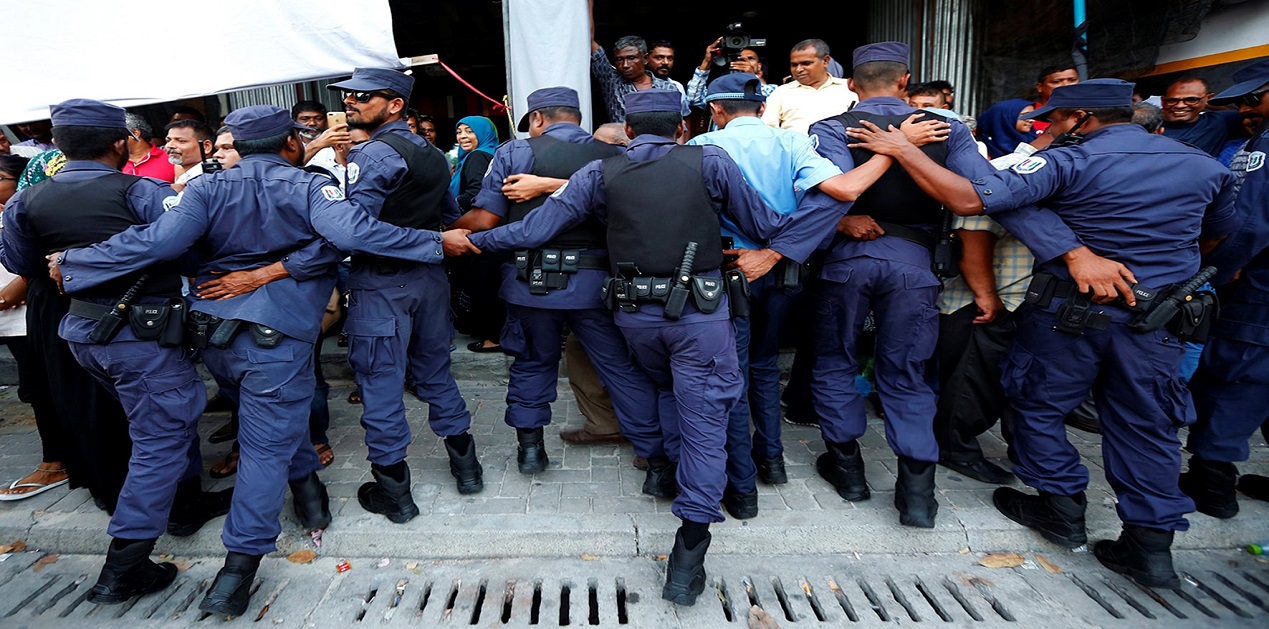

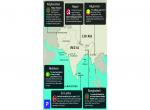
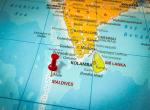

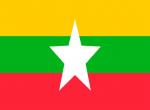
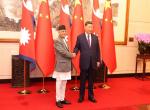
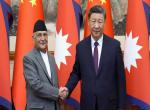

Post new comment